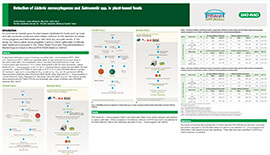
On This Page |
Introduction | Q&A | Resources | Talk with a Specialist |
In response to the need for reliable testing methods that address these new microbiological risks in plant-based meat testing, Bio-Rad is in progress to obtain AOAC PTM approval for the iQ-Check™ Salmonella II Real-Time PCR Method for plant-based meat product matrices.
Conversations with TEQ Analytical Labs and Bio-Rad
-

Alexandra Tudor (AT), TEQ Analytical Labs Director of Business Development
-

Mike Clark (MC), Bio-Rad Global Marketing Manager for Molecular Food Diagnostics
Alexandra Tudor* and Mike Clark explain how the validation study was conducted; the key technical and regulatory differences between animal-based vs. plant-based meats; and how Bio-Rad can support manufacturers to navigate the emerging food safety challenges in these new products.
* This interview was performed in 2022 when Alexandra was working at Analytical TEQ Labs. She is now account executive at Bio-Rad.
You recently worked with Bio-Rad to complete the AOAC validation study for Salmonella in plant-based meat products. What was your role and your key responsibilities in the study?
What were some of the technical challenges that you faced when analyzing plant-based meat products?
Do you think plant-based meat product testing should be subject to the same regulatory requirements as animal meat products? If so, why?
What are your thoughts on the future of plant-based meat product testing?
What food matrix category does plant-based meat products fall under?
Are there any new emerging microbiological risks or safety concerns for plant-based meats that are not common in animal meats?
How can plant-based meat producers ensure the microbiological safety of their products for consumers?
How can Bio-Rad help support plant-based meat producers to address these new emerging microbiological challenges?
Conclusion
- While plant-based meat will remain a permanent alternative protein option in restaurant menus and grocery stores, the need for standardised and validated testing methods is essential to monitor and ensure the microbiological safety of these products for consumers.
- Although food safety regulations and testing requirements for these products will inevitably evolve due to their unique and innovative design, food diagnostic experts like Bio-Rad continue to support and provide guidance for manufacturers to address these new changes.
Related Categories
Resources
-
Scientific Poster
Detection of Listeria monocytogenes and Salmonella spp. in plant-based foods.



